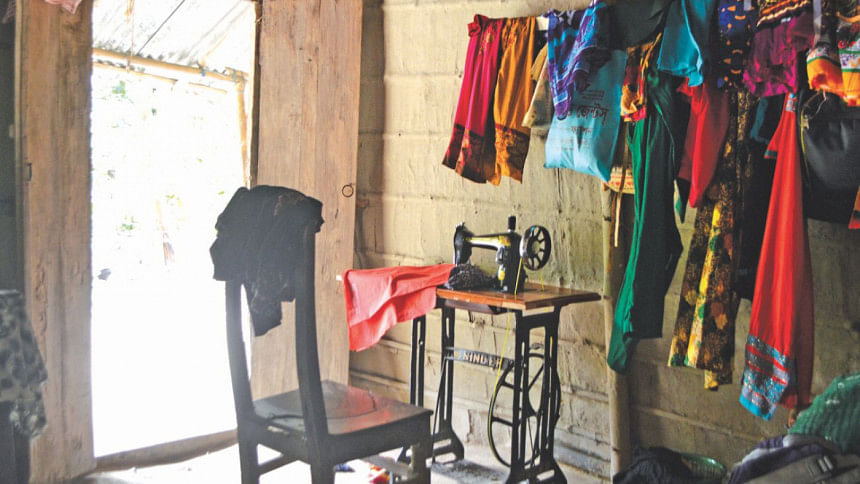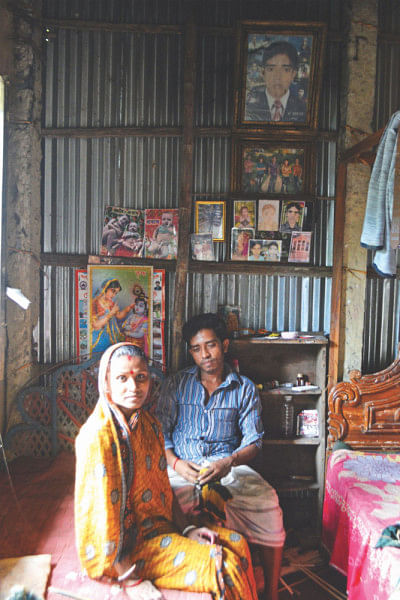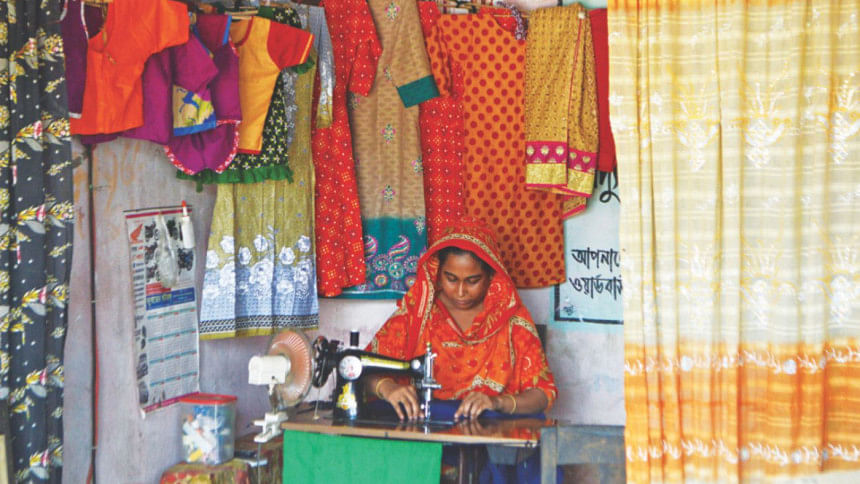A VILLAGE WITHOUT TV

One of the introductory scenes of Mostofa Sarwar Farooki's film Television goes like this: a female reporter asks the chairman of a village why he does not let the residents take photos or watch TV. A white screen separates the two such that they cannot see each other's faces.
"In Islam, taking pictures of men is a sin. So we neither take pictures nor allow anyone to do so," replies the chairman. The reporter then tries to school the leader on whether or not religion allows watching television and how it relates to democratic rights. The reporter says that her job is to "stand against injustice in my country." "Who gives you the right to do wrong?" she asks. The scene devolves into the chairman huffing out of the interview while the reporter narrates the story from her point of view. "The villagers want salvation from this chairman," she says into the mic—villagers gather behind her to vehemently refute her claim. She turns a deaf ear and starts to pack away her mic. That's when the villagers get rowdy and begin to harass her for wearing jeans to the village. The reporter makes a quick exit.
Nothing like that happened when I visited such a village last month, because that is not how real life works. The truth is a lot more complex. "There are 250 families in our village and I guess 20 among them own televisions," says Noor Ahmed, a young man living in the village of Purbo Kuorermati in Kanaighat upazila of Sylhet. We turn to his cousin sister, Halima Akhter, to ask whether she watches television. She shakes her head.

The fact that so few of the residents own TVs have little to do with their financial capacity and more to do with their religious preferences. Halima, for example, installed three ceiling fans and is saving for a refrigerator. Both she and Noor own a smartphone each. "I don't want to buy a TV because watching TV is not in my religion." I take her smartphone and ask for permission to look through her app drawer. She nods and unlocks the screen. Halima has a Facebook account, is learning English through an app, listens to Gazals and installed an app called "Bangla Waaz". Bangla Waaz contains an archive of speeches by social media-savvy clerics like Amir Hamza and convicted war-criminal Delwar Hossain Sayeedi.
I ask her if she uses YouTube. "Yes, I watch nothing bad!" she replies alarmed. "Nor am I using it this month because I'm fasting." We were speaking during Ramadan when many Muslims devote extra time to pious activities.
Whether they have televisions and what they do with their smartphones is completely their personal business, not to mention, their democratic right. This information is however important to provide context to what Halima did with a sewing machine she received from NGOs. Or more specifically, what she did not do.
The Alim-graduate (the grade 12 equivalent at madrassas) got the sewing machine in 2017, and then set up the machine in the front room of her home. "The women of the neighbourhood come to me to get their clothes made," says Halima. Her home is quite a distance away from the Union Parishad center, and the shortest way to access it is by walking—or taking a bicycle—across the thin bunds separating different paddy fields plots.
Wouldn't you get more customers if you set up shop closer to the markets, I ask. "I won't sit in the bazaar," she replies. Halima also does not have a voter ID card. "When people were registering for the cards, my brothers went. I had to stay home to take care of my grandmother," she adds.
Before packing up, I ask her if she would pose for a photo with her sewing machine. She refuses and moves out of the frame.
Consider Nasim Akter Lipi, another recipient of a sewing machine, Nasima Akhter Lipi. Lipi owns a tailoring shop in the market area of Loharajpur village at Moulvibazaar district. She has even expanded the shop to include a tiny tea stall in the front where men of the village gather to hang out. I ask her whether she also tends to the tea stall—Lipi says yes.
"When I first started making and selling clothes, I did not even own a pair of scissors. I used to cut the cloth with a cleaver knife. My father took pity on me and bought me scissors," says Lipi. Her husband left her five years ago and she found herself having to take care of three children on her own.
"I've had this shop for about two years now, although I only got the sewing machine last year. Before I was given a machine of my own, I had to loan it for Tk 50 per day," says Lipi. Lipi and Halima live only a district apart, but have vastly different ideas of what a woman can and cannot do.

The women were given sewing machines by the Suchana project—a European Union and DFID (Department for International Department) funded, multi-NGO, national initiative to tackle malnutrition in children. The sewing machines were given to enable mothers, or women of child-bearing age, to earn by themselves. Some got sewing machines, other got seed funding for setting up beauty parlours or weaving shops. Still others got batches of ducks, chickens, fish fry, and vegetable seeds.
These activities faced resistance in the village of Purbo Kuorermati and four others around it. "They were saying that we are bringing the women out of the house," says Mohammed Nazrul Islam, a social worker who leads Suchona's activities in Kanaighat upazila. "In Donmairmati village, the union parishad chairman had to step in. He sent pots of shirni to the local mosque and instructed the religious leaders to cooperate with us."
"We wanted the girls to do a presentation for the donors and the religious leaders went from house to house to tell everyone that whoever participates will be cut out of the panchayat," adds Nazrul.
"There was this woman who wanted to open a beauty parlour but could not at the end because her family did not let her set up shop at the market. Even yesterday I was talking to two women whose family members would not let them attend the trainings needed to become beauticians."
Nazrul names Kulurmati, Donmairmati, Manikpur, Dighirpar, and Shahpur as villages where religious enforcement runs high.
Bazlul Kabir Joarder, a technical manager of nutrition at Save the Children (one of the several NGOs working on Suchona) narrates a similar experience. "There was a widow with a daughter who wanted to be a recipient of Suchona's donations. We had nearly signed them up when a male cousin entered the room and started railing on them for wanting to take part in income generating activities. The daughter got up and left the room. 'Do we not feed you?' he yelled at the widow. That was the end of signing them up," describes Joarder.
"I also know of a social worker we hired, who is actually Hindu, but wears a burkha when going to these villages so that people accept her," he adds. Whether burkhas oppress or liberate is a tired, contentious topic that this article will not get into, but when a Hindu woman feels safer in a burkha it indicates a deeper problem.

"The men on the streets harass the women when they get out of the house to take part in the income generating activities," complains Nazrul.
Fatema Jannat Chowdhury, a twelfth grader who moonlights as a social worker, supervises a girls' club in Donmairmati village. These girls' clubs were also started by the Suchona project as a way of imparting knowledge about nutrition early. "The girls gather and play ludo. We wanted to give them skipping ropes so that they can have some physical activity as well, but the village elders forbade it," says Fatema. She says that she also cannot conduct regular cultural activities like music, dance, and drama because the villagers don't allow it. "We could only do it once, when the donors came to the village."
In comparison, girls' clubs in three unions of Moulvibazaar got together to present drama skits on topics like underage marriage, malnutrition, and domestic violence last month. One group acted out a sensitive scene where a mother goes into labour and gives birth, while another talked about the needs of proper nutrition when menstruating. Yet another girl turned on music and performed a dance routine—albeit in a burkha.
Religious enforcement has far-reaching impacts in these villages that go beyond freedom of expression. The social worker, Jannat, also supervises a girls' club in a village that is "non-problematic"—because of the open-mindedness of the residents, she has already convinced the girls to switch from using old rags to sanitary napkins. "We now have the courage to go out and buy our own sanitary napkins," says Safia Begum, one of the members of the club.
Television documents the way that villagers show resistance to the fatwa that forbids them from such recreational activities. The actors fall in love and secretly talk over Skype, villagers gather to watch television at a Hindu home. Similarly, Halima Akter too has her secret. In her app drawer was an application called "Beautify Me". I quietly ask her if she takes selfies. Halima grins mischievously and nods.

 For all latest news, follow The Daily Star's Google News channel.
For all latest news, follow The Daily Star's Google News channel. 



Comments